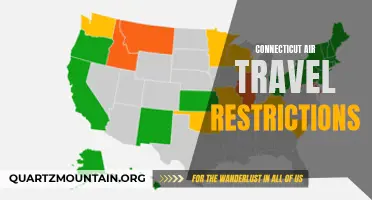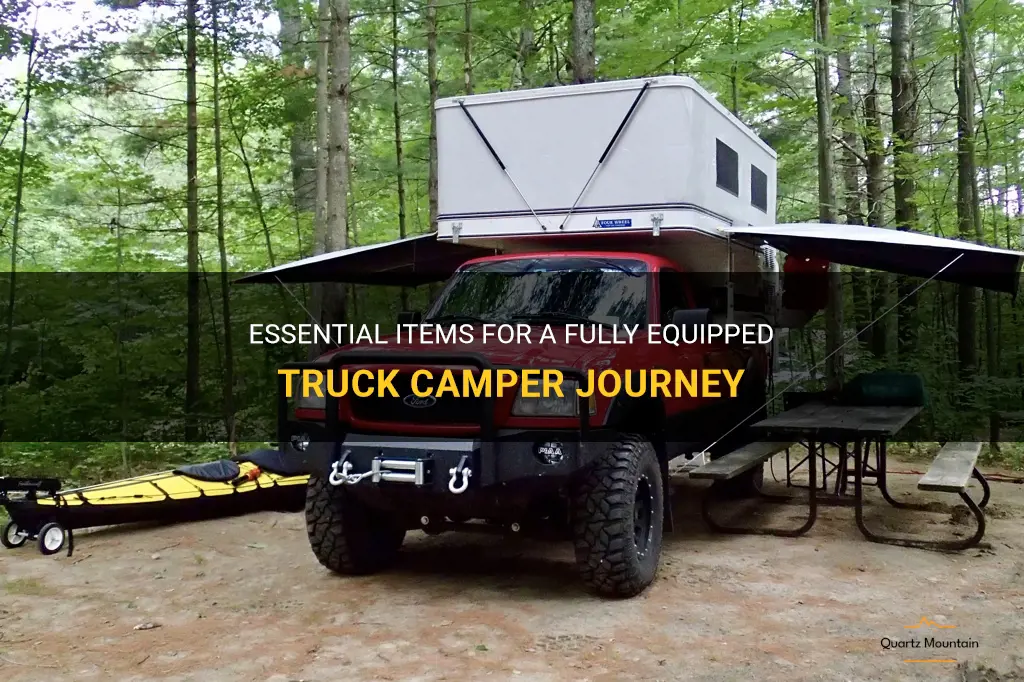
Embarking on a truck camper journey is an exciting and adventurous way to explore the great outdoors. But before you hit the open road, it's important to make sure you're fully equipped for your adventure. From camping essentials to vehicle maintenance items, having the right gear can make all the difference in ensuring a smooth and enjoyable trip. Whether you're a seasoned camper or a first-time camper, this guide will provide you with a comprehensive list of essential items for a fully equipped truck camper journey. So grab your maps, charge your camera, and get ready for an unforgettable adventure on the open road!
What You'll Learn
- What are the essential items to pack in a truck camper for a camping trip?
- How do I maximize storage space in a truck camper when packing?
- Are there any specific safety items or emergency supplies that should be packed in a truck camper?
- What are some tips for organizing and packing food in a truck camper for an extended trip?
- Are there any specific tools or equipment that should be packed in a truck camper for maintenance or repairs on the road?

What are the essential items to pack in a truck camper for a camping trip?

When going on a camping trip in a truck camper, it is important to pack all the essential items for a comfortable and enjoyable experience. While the specific items may vary depending on personal preferences and the destination, there are some items that are essential for any camping trip. Here is a list of the essential items to pack in a truck camper for a camping trip:
- Bedding: Bring comfortable bedding including pillows, blankets, and sleeping bags. This will ensure a good night's sleep after a long day of outdoor activities.
- Cooking Equipment: Pack a portable stove or grill, along with pots, pans, and utensils for cooking meals. Don't forget to bring a cooler or refrigerator to store perishable food items.
- Food and Water: Bring an ample supply of non-perishable food items such as canned goods, dried fruits, and nuts. Additionally, pack enough drinking water to last the duration of the trip.
- Clothing: Pack appropriate clothing for the weather conditions at the camping destination. It is important to bring both warm and cold weather clothing, as temperatures can vary greatly depending on the time of day.
- Toiletries: Don't forget basic toiletries like toothbrush, toothpaste, soap, and toilet paper. It is also a good idea to bring a small first aid kit for any minor injuries.
- Lighting: Pack flashlights or lanterns for nighttime activities. This will ensure visibility and safety while moving around the campsite after dark.
- Tools and Equipment: Bring a basic set of tools for any emergency repairs that may be required. Additionally, pack camping essentials such as a folding camping chair, a camping table, and a tarp for shelter.
- Entertainment: It is important to bring items for entertainment during downtime at the campsite. This could include board games, playing cards, books, or even musical instruments.
- Navigation Aids: Bring a map and compass or a GPS device to navigate the camping area. This will help you explore the surrounding trails and attractions.
- Personal Items: Finally, don't forget to pack personal items such as sunglasses, sunscreen, insect repellent, and any necessary medications.
By packing these essential items, you will be well-prepared for a comfortable and enjoyable camping trip in a truck camper. Remember to plan ahead and consider the specific needs and preferences of your travel companions to ensure a successful camping adventure.
Essential Items to Pack for a Trip to Austria
You may want to see also

How do I maximize storage space in a truck camper when packing?
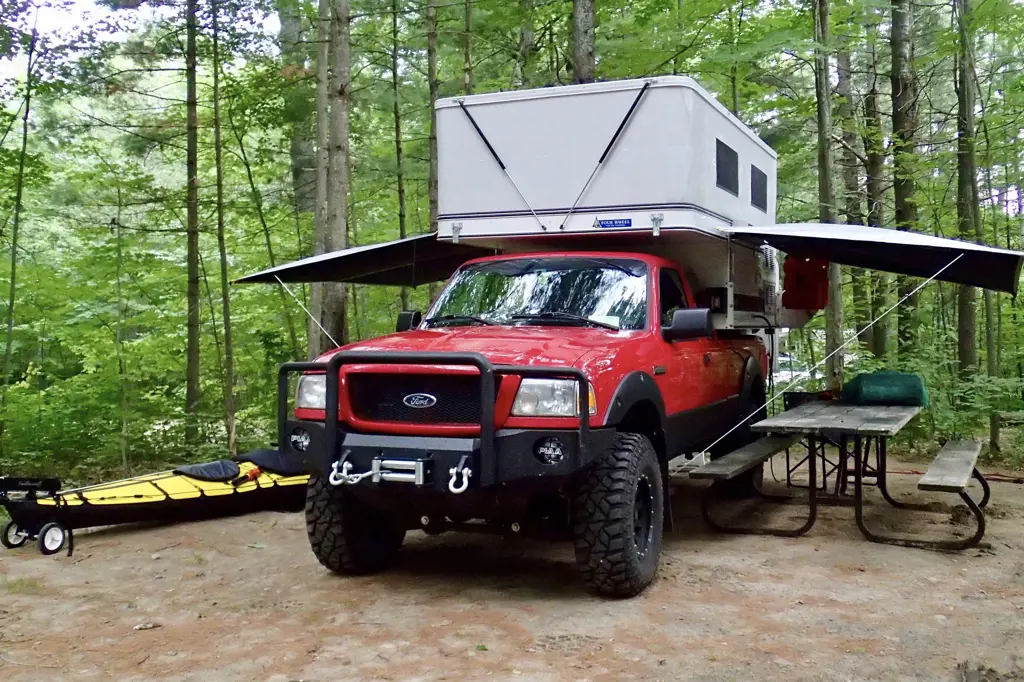
Truck campers offer a convenient and compact way to travel and camp, but one challenge that camper enthusiasts often face is limited storage space. With some planning and strategic packing techniques, however, it is possible to maximize storage space in a truck camper and make the most of every inch available.
- Assess your needs: Before packing, make a list of essential items you will need during your trip. Consider the duration of your trip, the type of activities you will be doing, and the climate. This will help you prioritize what to pack and eliminate any unnecessary items.
- Utilize storage compartments: Most truck campers come equipped with various storage compartments. Take advantage of these compartments to store items that are not frequently needed, such as camping gear, spare parts, or additional clothing. Use plastic bins or organizers to keep the compartments tidy and make items easily accessible.
- Utilize vertical space: In a small space like a truck camper, it's essential to think vertically. Install hooks or hanging organizers on walls or inside cabinet doors to hang items like hats, jackets, or small tools. Utilize adjustable shelving units or stacking baskets to maximize vertical storage in cabinets and closets.
- Use vacuum storage bags: Vacuum storage bags are a traveler's best friend when it comes to maximizing storage space. These bags allow you to compress clothing or bedding, reducing their size dramatically. Pack items like pillows, blankets, or bulky clothing in vacuum bags, and then simply suck the air out with a vacuum cleaner. This will free up a significant amount of space in your camper.
- Pack strategically: When it comes to packing, efficiency is key. Start by packing heavier items at the bottom and evenly distribute the weight to maintain balance while driving. Roll clothes instead of folding them to save space and prevent wrinkles. Utilize empty spaces, such as inside shoes or pots, to store small items or accessories. Consider using packing cubes or organizers to keep similar items together and make unpacking easier.
- Consider multi-purpose items: Opt for multi-purpose items whenever possible to minimize the number of things you need to pack. For example, a collapsible cooking pot can serve as both a cooking utensil and a storage container. Look for items that can serve multiple functions, such as a camping chair that can also be used as a stool or a table.
- Think outside the camper: If you still find yourself struggling to fit everything inside the camper, consider utilizing external storage options. Install a roof rack or a hitch-mounted cargo carrier to carry larger items like bicycles, kayaks, or coolers. This will free up valuable space inside the camper for other essential items.
To summarize, maximizing storage space in a truck camper requires careful planning and creative thinking. By assessing your needs, utilizing storage compartments, making use of vertical space, using vacuum storage bags, packing strategically, considering multi-purpose items, and utilizing external storage options, you can make the most of the available space and ensure a comfortable and organized camping experience.
Essential Items to Pack for Backpacking in India
You may want to see also

Are there any specific safety items or emergency supplies that should be packed in a truck camper?
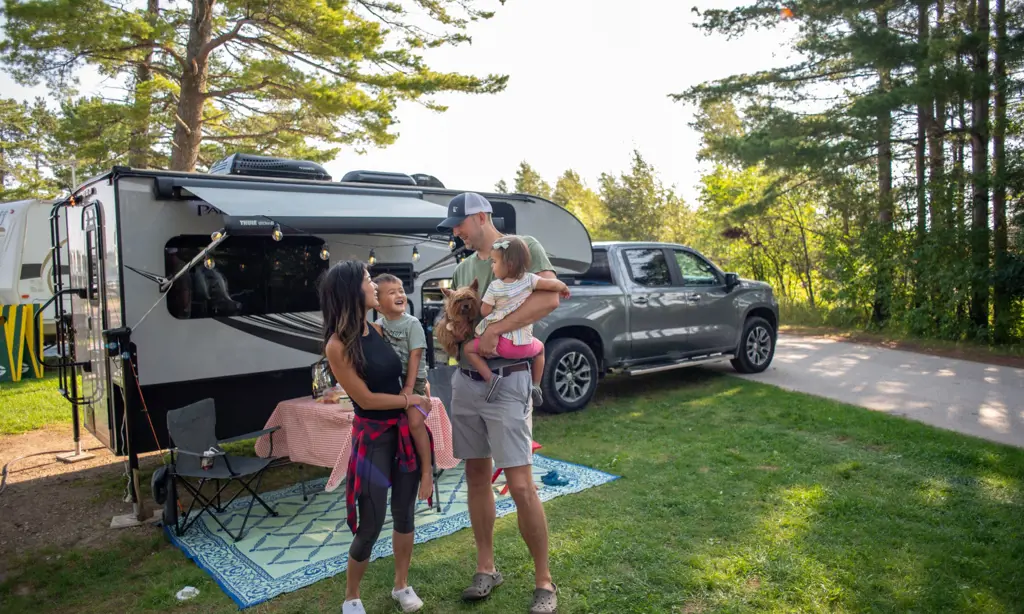
Truck campers are a popular choice for outdoor enthusiasts who enjoy camping and exploring the great outdoors. These compact and versatile recreational vehicles offer the convenience and comfort of a traditional camper, with the added benefit of being able to travel off the beaten path. However, it's important to be prepared for any situation that may arise while camping in a truck camper. This includes having the necessary safety items and emergency supplies on hand.
One of the first safety items that should be packed in a truck camper is a first aid kit. This kit should include basic supplies such as bandages, gauze, antiseptic ointment, and adhesive tape. It's also a good idea to include additional items such as pain relievers, allergies medications, and any necessary prescription medications. In addition to a first aid kit, it's also recommended to have a supply of sunscreen and insect repellent to protect against sunburn and bug bites.
Another important safety item to pack in a truck camper is a fire extinguisher. This is crucial in the event of a fire and can help prevent a small fire from turning into a major disaster. It's important to ensure that the fire extinguisher is easily accessible and in good working condition. Additionally, it's a good idea to familiarize yourself with how to properly use a fire extinguisher before heading out on your camping trip.
Emergency supplies are another essential item to pack in a truck camper. These supplies should include items such as a flashlight, extra batteries, a portable radio, and a whistle. These items can be invaluable in the event of a power outage or if you become lost or stranded. Additionally, it's recommended to have a supply of non-perishable food, water, and extra blankets or sleeping bags in case of an emergency.
It's also important to consider the specific needs of your camping destination when packing safety items and emergency supplies. For example, if you're planning on camping in an area known for snake activity, it may be a good idea to pack a snake bite kit. Similarly, if you're planning on camping in an area with extreme weather conditions, it's important to pack appropriate clothing and gear to stay warm and dry.
In conclusion, there are several specific safety items and emergency supplies that should be packed in a truck camper. These items include a first aid kit, fire extinguisher, emergency supplies (such as a flashlight, radio, and non-perishable food), and any additional items specific to your camping destination. Being prepared and having these items on hand can help ensure a safe and enjoyable camping experience in your truck camper.
Essential Items to Pack for Your Isla Mujeres Getaway
You may want to see also

What are some tips for organizing and packing food in a truck camper for an extended trip?
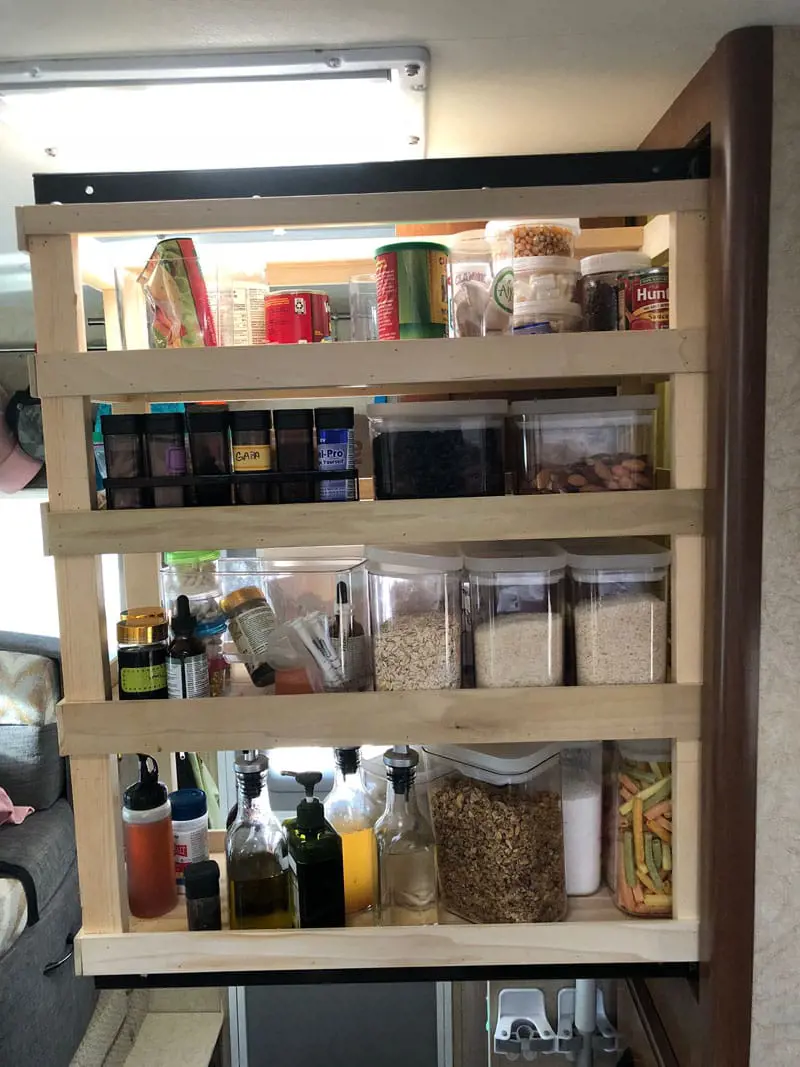
Organizing and packing food in a truck camper for an extended trip can be a challenging task. However, with some planning and organization, it is possible to efficiently store and manage your food supplies during your journey. Here are some tips to help you:
- Make a meal plan: Before the trip, create a detailed meal plan for the duration of your journey. This will help you determine what food items you will need and how much of each item you should buy. It will also give you an idea of the kitchen tools and utensils you should bring.
- Choose non-perishable and lightweight items: When selecting food items for your trip, opt for non-perishable and lightweight options. Canned goods, dried fruits, nuts, and dehydrated meals are great choices as they have a long shelf life and are easy to carry.
- Use resealable containers and bags: To keep your food organized and fresh, invest in resealable containers and bags. This will prevent spills and keep your food safe from pests. Use clear containers, so you can easily see the contents without having to open them.
- Pack similar items together: Group similar food items together for easy access. For example, pack all your breakfast items in one container, snacks in another, and so on. This will save you time and effort when searching for specific items.
- Utilize space efficiently: Truck campers have limited storage space, so it is essential to maximize every inch. Utilize overhead compartments, under-bed storage, and any available nooks and crannies. Consider using collapsible containers and stackable storage bins to make the most of your space.
- Take advantage of fridge/freezer space: If your truck camper has a refrigerator or freezer, make full use of it. Store perishable items like meat, dairy, and fresh produce in the fridge to keep them fresh for longer. Consider using freezer bags to save space and prevent freezer burn.
- Label and date your food: To prevent confusion and avoid wasting food, label and date your containers. This will help you keep track of when items were packed and will allow you to prioritize consuming perishable items first.
- Pack cooking essentials: Don't forget to pack essential cooking tools and utensils such as a stove, pots, pans, knives, cutting board, and can opener. These items will ensure that you can prepare and cook your meals on the go.
- Practice good food safety habits: While on the road, it is crucial to follow proper food safety practices. Keep raw meats and cooked foods separate to prevent cross-contamination. Wash your hands before preparing meals and clean all utensils and surfaces thoroughly.
- Stock up on water: Water is essential for both cooking and staying hydrated. Make sure to bring enough water for your trip, or plan for stops to refill your water supply along the way.
Remember, organizing and packing food in a truck camper is not just about efficient storage; it also requires planning and consideration for food safety. By following these tips, you can ensure a well-stocked and organized kitchen on your extended trip.
Ultimate Packing Guide for a December Trip to Nashville
You may want to see also

Are there any specific tools or equipment that should be packed in a truck camper for maintenance or repairs on the road?
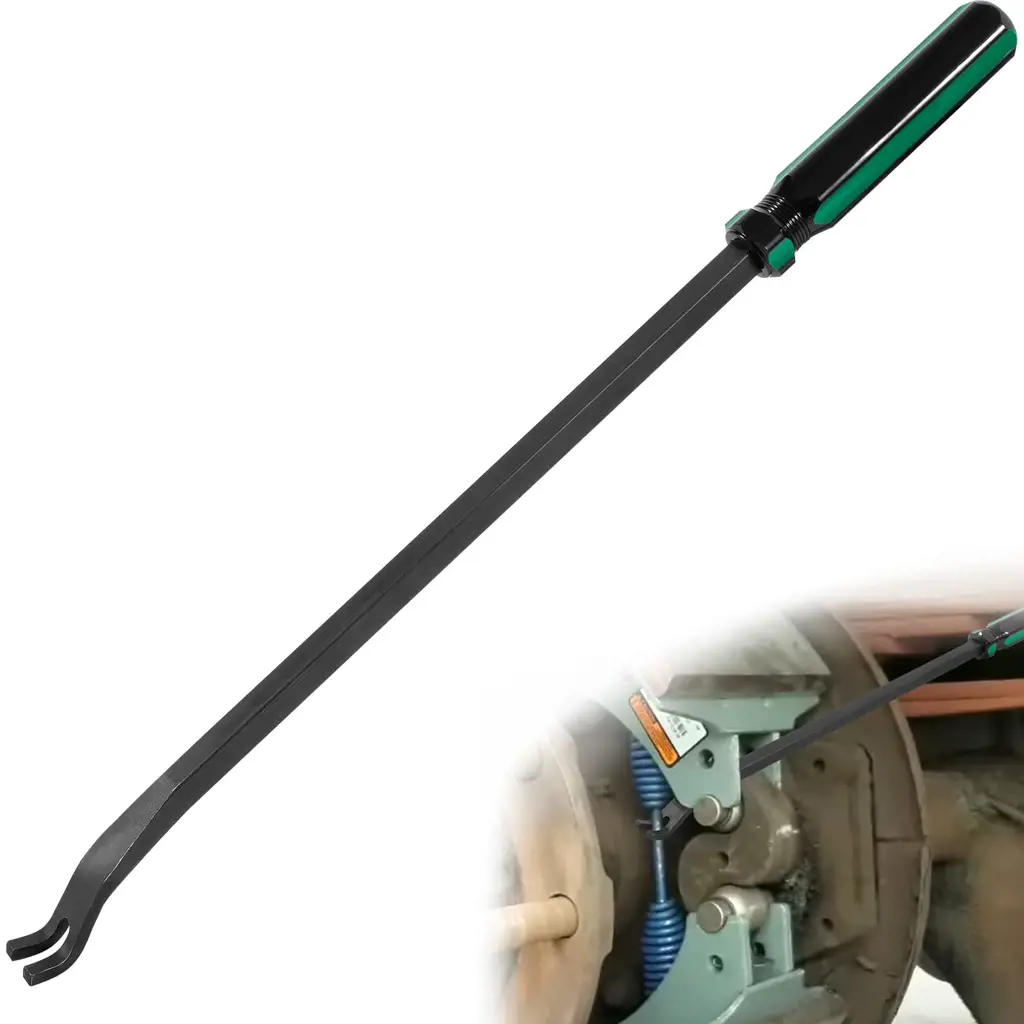
When embarking on a journey with a truck camper, it's important to be prepared for any maintenance or repair needs that may arise on the road. Having the right tools and equipment can make all the difference in handling these issues efficiently and effectively. Here are some specific tools and equipment that should be packed in a truck camper for maintenance or repairs:
- Basic hand tools: It's essential to have a basic set of hand tools, including screwdrivers, pliers, wrenches, and a hammer. These tools can be used for a wide range of tasks, such as tightening loose screws, adjusting components, or removing and installing small parts.
- Socket set: A socket set is a versatile tool for various mechanical repairs. It contains a combination of sockets in different sizes, along with a ratchet and extension bars. This allows you to easily tighten or loosen bolts and nuts of various sizes.
- Multi-meter: An electronic multi-meter is a crucial tool for diagnosing electrical issues in your truck camper. It can measure voltage, current, and resistance, helping you troubleshoot and fix any electrical problems that may arise.
- Tire repair kit: A tire repair kit is a must-have item for any road trip. It typically includes tire plugs, patches, and a reamer to repair punctures in case of a flat tire. Make sure to also carry a portable air compressor or tire inflator to top up the tire pressure.
- Duct tape and zip ties: These versatile items can come in handy for temporary fixes until you can reach a professional repair service. Duct tape can be used to seal cracks, secure loose parts, or temporarily fix leaking hoses. Zip ties are useful for securing cables, holding broken parts together, or creating makeshift repairs.
- Spare fuses and electrical supplies: Carrying spare fuses of different sizes is essential to quickly replace a blown fuse and restore functionality to electrical circuits. Additionally, having some extra electrical supplies, such as wire connectors, electrical tape, and a wire cutter/stripper, can help you address minor electrical issues.
- Lubricants and fluids: It's important to have a supply of lubricants and fluids to keep your truck camper running smoothly. Carry a bottle of engine oil, brake fluid, coolant, and any other specific fluids your camper's systems may require. Additionally, a can of penetrating oil or lubricating spray can help free rusted or stuck parts.
- Jack and lug wrench: These tools are necessary for changing a flat tire or performing any task that requires lifting the camper. Make sure your jack is properly rated to handle the weight of your camper, and keep a lug wrench that fits your wheel's lug nuts.
- Safety equipment: No road trip toolkit is complete without safety equipment. Pack a fire extinguisher, a first-aid kit, and a reflective vest. It's also a good idea to have a flashlight, extra batteries, and road flares or warning triangles to signal your presence in case of an emergency.
- User manuals and guides: Finally, don't forget to carry user manuals and guides specific to your truck camper. These documents often contain valuable information about troubleshooting common issues, maintenance procedures, and important contact numbers for customer support or authorized repair centers.
Remember, it's always better to be over-prepared than under-prepared when it comes to maintaining and repairing your truck camper on the road. Having these essential tools and equipment will give you peace of mind and ensure you can handle minor repairs and maintenance tasks with ease.
The Essential Guide to Packing for a Retreat at Golden Door
You may want to see also
Frequently asked questions
When packing your truck camper, it's important to include kitchen essentials to ensure you have everything you need to prepare meals on the road. Some recommended items to pack include a set of pots and pans, utensils, plates, bowls, cups, and cutlery. Don't forget to bring a can opener, a sharp knife, and cooking tools like a spatula and tongs. It's also a good idea to pack kitchen basics like cooking oil, spices, and condiments to add flavor to your meals.
If you plan on enjoying outdoor activities during your truck camper adventure, it's helpful to pack some essential camping gear. This may include items such as camping chairs, a portable grill or stove, a cooler or fridge for food storage, a tent for additional sleeping space, a portable campfire for cooking or warmth, and camping equipment like hiking boots, backpacks, and a first aid kit. Make a checklist of the activities you plan to do and pack accordingly.
When packing clothing for a truck camper trip, it's important to consider the weather conditions and the duration of your journey. Pack a mix of short-sleeved and long-sleeved shirts, as well as sweaters or jackets for colder nights. Bring enough socks, underwear, and sleepwear to last the duration of your trip, along with comfortable walking shoes or boots. Don't forget to pack a hat, sunglasses, and sunscreen for sun protection, as well as a swimsuit or hiking gear if you plan on participating in water activities or hiking.
In addition to kitchen essentials, camping gear, and clothing, there are several other essential items to include in your truck camper. These include basic toiletries such as toothpaste, toothbrushes, soap, shampoo, conditioner, and toilet paper. It's also important to pack a fire extinguisher, a basic tool kit, a flashlight or headlamp, extra batteries, a basic first aid kit, and a map or GPS device for navigation. Additionally, you may want to bring camping chairs, a portable power bank or generator, a camera or binoculars for sightseeing, and any personal items you may need such as prescription medications or electronics.






